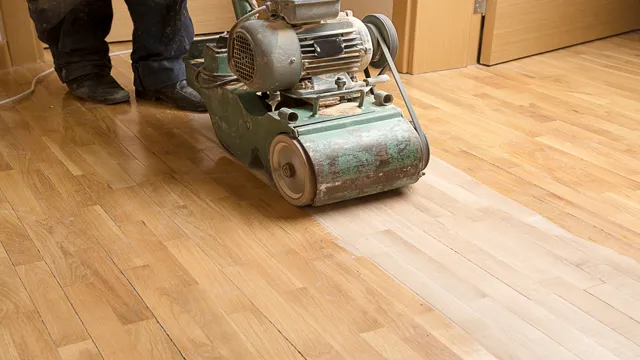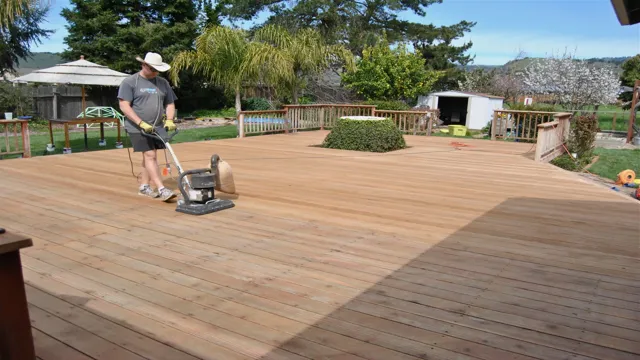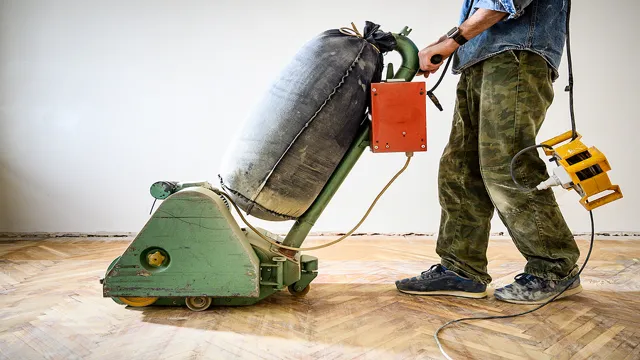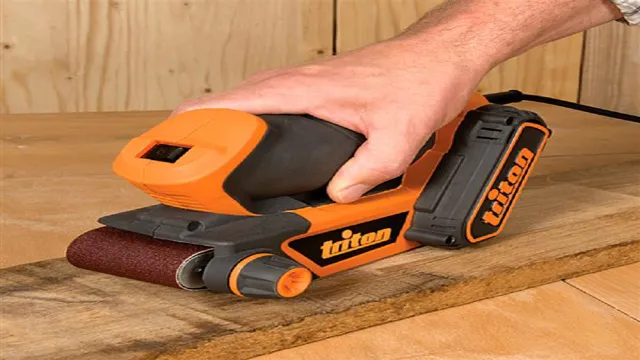Can I Rent a Floor Sander? Unveiling Your Guide to Renting a Floor Sander
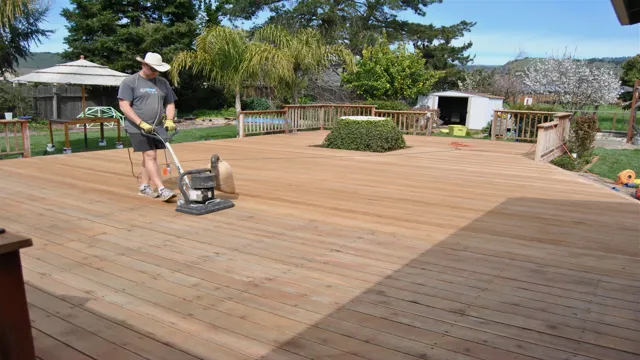
Revitalizing the floors of your home or office can go a long way in improving the overall look and feel of the space. However, finding and renting the right machinery for the job can be intimidating, especially if you’re new to the world of flooring. If you’re planning on renting a floor sander, there are a few essential things you need to know.
While there are many types of sanders available in the market, choosing the right one for your specific needs is vital to ensure the best results. In this blog post, we’ll cover everything you need to know about renting a floor sander, from choosing the right type of sander to preparing your floors for sanding and applying the finishing touches. Whether you’re a seasoned DIY enthusiast or a first-time user, this guide will help you get the job done correctly.
So, let’s get started!
Types of Floor Sanders Available for Rent
If you’re planning on sanding your floors, there’s no need to invest in a costly piece of equipment when renting a floor sander is an affordable and efficient solution. There are different types of floor sanders available for rent, each with unique features that make them suitable for specific projects. One type is the drum sander, ideal for sanding large wood floors due to its ability to remove thick layers of paint and finish.
Another option is the random-orbit sander, which is a versatile tool that can flatten surfaces and be used on both hardwood and softwood. Additionally, the edge sander is perfect for sanding the edges of floors and stairs, as it has a design that allows it to fit into tight corners and narrow spaces. The best part of renting a floor sander is the ability to choose the perfect one for your specific needs and budget.
So, yes, you can rent a floor sander and make your DIY floor renovation project a success without breaking the bank.
Drum Sanders
If you’re looking to restore and refinish your hardwood floors, then renting a floor sander is a must. However, with so many types of sanders available for rent, it can be confusing to know which one to choose. One type of floor sander that you may come across is the drum sander.
Drum sanders are excellent for removing deep scratches and leveling uneven floors, making them ideal for large floor restoration projects. These sanders come in two types; the traditional drum sander that requires a bit of experience to use and a newer version called the belt sander. Belt sanders work similarly to traditional drum sanders but are easier to control and less likely to gouge the floor.
Ultimately, the type of sander you choose will depend on your experience and the specific needs of your project.
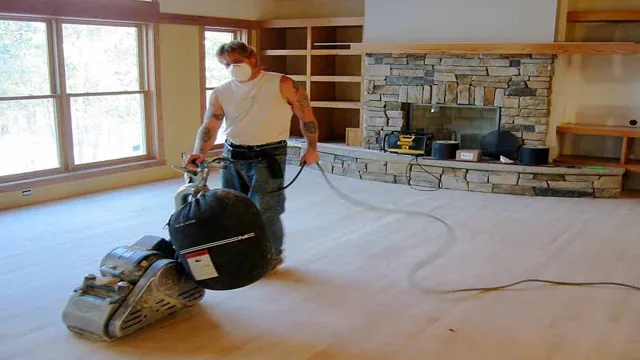
Oscillating Sanders
When it comes to sanding floors, there are several types of floor sanders available for rent, each with its own unique features. One popular option is the oscillating sander, which operates by vibrating in a circular motion. Oscillating sanders are ideal for removing old finishes and stains, as well as sanding down uneven spots on the floor.
They’re also great for getting into tight corners and hard-to-reach areas. However, they can be a bit challenging to control, and they tend to leave swirl marks on the floor if not used correctly. Despite these challenges, an oscillating sander is an excellent choice for anyone looking to refinish their floors on a budget.
Sheet Sanders
When it comes to sanding floors, there are several types of floor sanders available for rent. One of these types is the sheet sander, also known as a finishing sander. Sheet sanders come in different sizes and shapes, and they are perfect for smoothing out surfaces.
They are not aggressive sanders, making them ideal for finishing and refinishing projects. The sheet sander operates by using a motor to move its rectangular sanding pad back and forth. It sands in a circular or elliptical pattern and has a dust collection bag attached to it to minimize clean-up.
It is essential to wear safety gear such as goggles and a face mask as the dust that sheet sanders produce can be harmful to the lungs and eyes. Sheet sanders are easy to operate and do not require much skill, making them ideal for DIYers and those without experience with sanding floors. If you are planning on renting a sheet sander, ensure the rental place provides sandpaper in varying grits, including coarse and fine, to give you different sanding options and help you achieve the desired finish.
How to Choose the Right Floor Sander for Your Project
Yes, you can rent a floor sander for your next home improvement project. Choosing the right floor sander is crucial for the success of your project. There are different types of floor sanders available, each with unique features and capabilities.
The most common types include drum sanders, orbital sanders, and edge sanders. Drum sanders are ideal for sanding large areas of hardwood floors as they can remove a lot of material quickly. Orbital sanders, on the other hand, are best for finishing work as they offer a smooth, fine finish.
Edge sanders are designed to sand tight areas and corners that other sanders can’t reach. Consider the type of project you have and the type of wood you are sanding before choosing a sander to rent. It’s also important to ensure you have the necessary safety equipment and follow all safety precautions when sanding floors.
With the right sander and proper safety measures, you can achieve a beautiful, refreshed floor that will add value to your home.
Consider the Type of Flooring
When it comes to choosing the right floor sander for your project, one of the most important factors to consider is the type of flooring you’re working with. Not all sanders are created equal, and different types of flooring require different approaches. For example, solid hardwood floors need special care to protect their delicate finish, while engineered wood flooring may need a more aggressive sanding approach.
Additionally, if you’re working with laminate, vinyl, or tile flooring, you may need to use a different type of sander altogether. It’s important to do your research and choose a floor sander that is specifically designed for your flooring type to avoid damaging your floors or creating a subpar finish. With the right sander and a little bit of know-how, you can get professional-looking results on your flooring project that will leave you with floors that look like new.
Assess the Condition of the Floor
When it comes to refinishing your floors, choosing the right floor sander can make all the difference. The first step in picking the right sander is to assess the condition of your floor. Determine if your floor has any major scratches, stains or unevenness that need to be addressed before sanding.
If you have deep scratches or unevenness, you may need to start with a heavier grit sander before moving onto a lighter one for finishing. On the other hand, if your floor has minor imperfections, a lighter sander may be all you need. It’s important to take the time to properly assess your floor to avoid damaging it during the sanding process.
By taking this step, you’ll be able to choose the right sander for your specific project and achieve the results you’re looking for.
Size of the Project
When it comes to choosing the right floor sander for your project, the size of the project is a crucial factor to consider. For small projects such as refinishing a single room or a small area, a handheld sander or a small orbital sander will do the job just fine. However, for larger projects such as sanding an entire home or commercial property, a drum sander or a large orbital sander would be more suitable.
Using a smaller sander for a larger project would take too much time and effort, resulting in fatigue and a less than desirable finish. On the other hand, using a larger sander for smaller projects can damage the floor and end up being more expensive than necessary. It’s essential to assess the size of the project carefully and choose the right floor sander based on the scope of work.
Taking the time to research and understand the different types of sanders available will help you make an informed decision that will save you time and money in the long run. In summary, choosing the right floor sander for your project starts by considering the size of the project. A rule of thumb is to match the size of the sander with the size of the project to get the job done efficiently and effectively.
So, whether it’s a small DIY home renovation project or a large commercial property, make sure you select the right floor sander that best suits your needs.
Tips for Renting a Floor Sander
If you’re planning on refinishing your hardwood floors, renting a floor sander is a practical and cost-effective option. Yes, you can rent a floor sander, but there are a few things you need to consider before doing so. First, you need to be prepared for the physical labor involved in sanding the floors and moving the equipment around.
Second, it’s essential to choose the right type of floor sander based on the size of your project, the state of your floors, and your skill level. Belt sanders are ideal for larger areas, while orbital sanders are better suited for small spaces and delicate floors. Finally, make sure to read the rental agreement carefully and ask questions if you have any concerns.
Most rental companies offer instructions and safety tips to help you use the equipment correctly. With some careful planning and attention to detail, renting a floor sander can be an excellent way to achieve beautiful, polished floors without breaking the bank.
Do Your Research on Rental Companies
When renting a floor sander, it’s important to do your research on rental companies before making a decision. Look for a reputable company with good reviews and reliable equipment. You don’t want to end up with a subpar sander that can’t handle the job at hand, or worse yet, breaks down mid-project.
Check the rental agreement carefully and make sure you understand the terms, such as the rental period, fees, and any required deposits. It’s also a good idea to ask about maintenance and repair services, in case the equipment needs attention during the rental period. By doing your due diligence and choosing a trustworthy rental company, you can ensure a successful and stress-free floor sanding project.
Check the Rental Terms and Conditions
When planning to rent a floor sander, it is essential to read the rental terms and conditions thoroughly. Many rental companies have specific policies on the use of their equipment, including fees and penalties for damage or late returns. Make sure you understand the details of the contract, including the rental period, deposit amount, and payment method.
Additionally, check if the company provides any safety gear, such as goggles or earplugs, as well as maintenance instructions and cleaning procedures before returning the equipment. By taking the time to review the rental terms and conditions, you’ll ensure that you have a smooth rental experience and avoid any extra fees or charges. So, be proactive and ask questions if you’re unsure about anything before signing the rental contract.
Get the Necessary Accessories
One of the essential tips for renting a floor sander is to get the necessary accessories. A floor sander is not the only tool that you need to get the job done. You require a dust mask, ear protection, eye protection, and gloves to protect yourself from dust, debris, and noise.
In addition, you need sandpaper, sanding disks, and polishing pads to ensure that the floor is smooth and shiny after sanding. You can rent or buy these accessories from the same store where you rent the floor sander. It is crucial to check the compatibility of the accessories with the floor sander to prevent malfunctions or accidents.
Remember to read and follow the instructions on how to use the accessories properly. By getting the necessary accessories, you can ensure that the floor sanding process is safe and efficient, resulting in a beautiful, polished floor.
Final Thoughts on Renting a Floor Sander
If you’re wondering “can I rent a floor sander?”, the answer is yes! Renting a floor sander is a great option if you only have a one-time project or want to save money compared to hiring a professional. However, before you rent a floor sander, there are a few things you should keep in mind. First, make sure you have a good understanding of the type of floor you have and the type of sander you need.
Choosing the wrong sander can result in damage to your floors, so it’s important to do your research before renting. Additionally, be prepared to spend some time and effort on the sanding process. Using a floor sander can be tough work, especially if you’re a beginner, but the end result is usually worth it.
Overall, renting a floor sander can be a great option for those looking to save money on their home renovation projects, as long as you do your research and are prepared for the work involved.
Conclusion
In the quest for a pristine floor, it’s natural to mull over the question – can I rent a floor sander? Well, if you’re determined to make your floors shine like the sun, then renting a floor sander is the perfect solution. It’s a cost-effective way of transforming your floors without breaking the bank. So go ahead and rent that floor sander – your floors will thank you for it (and so will your wallet).
“
FAQs
What is a floor sander and how does it work?
A floor sander is a tool used for sanding down wooden floors to remove surface scratches and imperfections. It works by removing thin layers of wood using sandpaper attached to a rotating drum.
Can I rent a floor sander from a hardware store?
Yes, most hardware stores offer rental services for floor sanders. You can either rent the machine for a specific period of time or for a specific project.
How much does it cost to rent a floor sander?
The cost of renting a floor sander depends on the type of machine, the duration of the rental, and the location. On average, renting a floor sander can cost anywhere from $50 to $200 per day.
Do I need any special skills to operate a floor sander?
While it’s not necessary to have any special skills, it’s important to follow the manufacturer’s instructions carefully. It’s also important to wear protective gear such as goggles and a mask to avoid inhaling dust.
Can a floor sander be used on all types of floors?
A floor sander is best suited for wooden floors and should not be used on other types of flooring such as laminate, vinyl, or tile.
How long does it take to sand a wooden floor with a floor sander?
The time it takes to sand down a floor with a sander depends on the size of the space, the power of the machine, and the condition of the floor. On average, it can take anywhere from 2-4 hours to sand a standard sized room.
What is the best way to prepare a room for floor sanding?
Before sanding, it’s important to remove all furniture, curtains, and decorations. Additionally, it’s important to cover any vents or electrical outlets to prevent dust from entering. Finally, make sure to sweep and vacuum the floor thoroughly to remove any debris.

